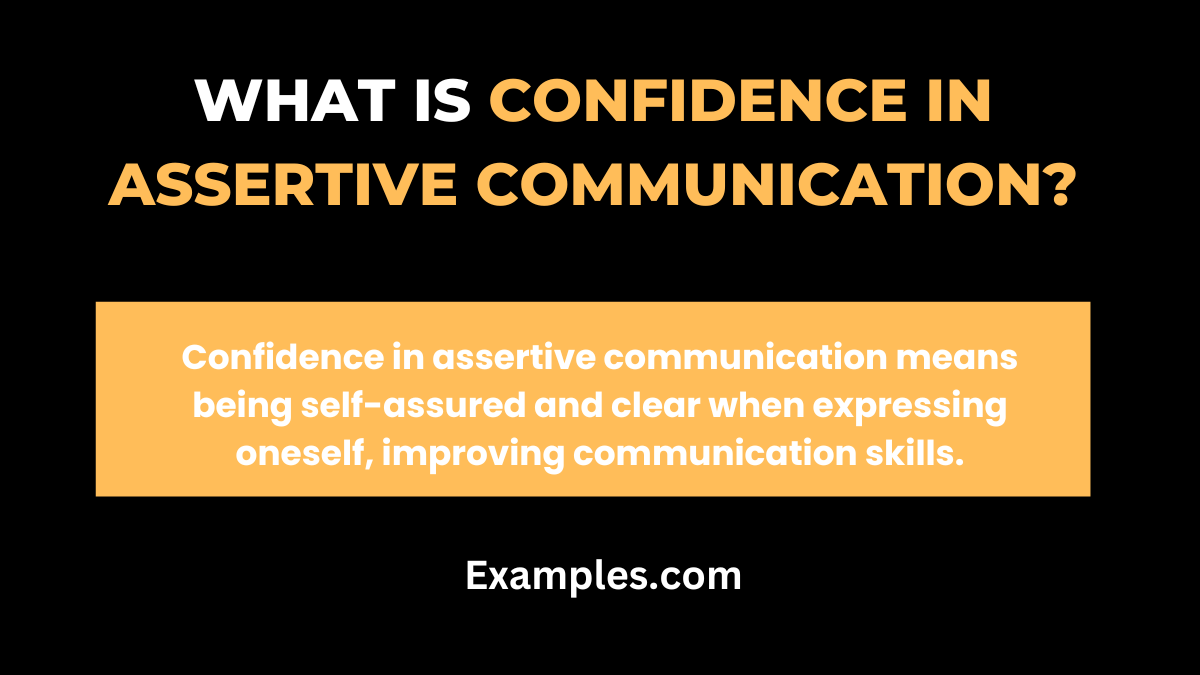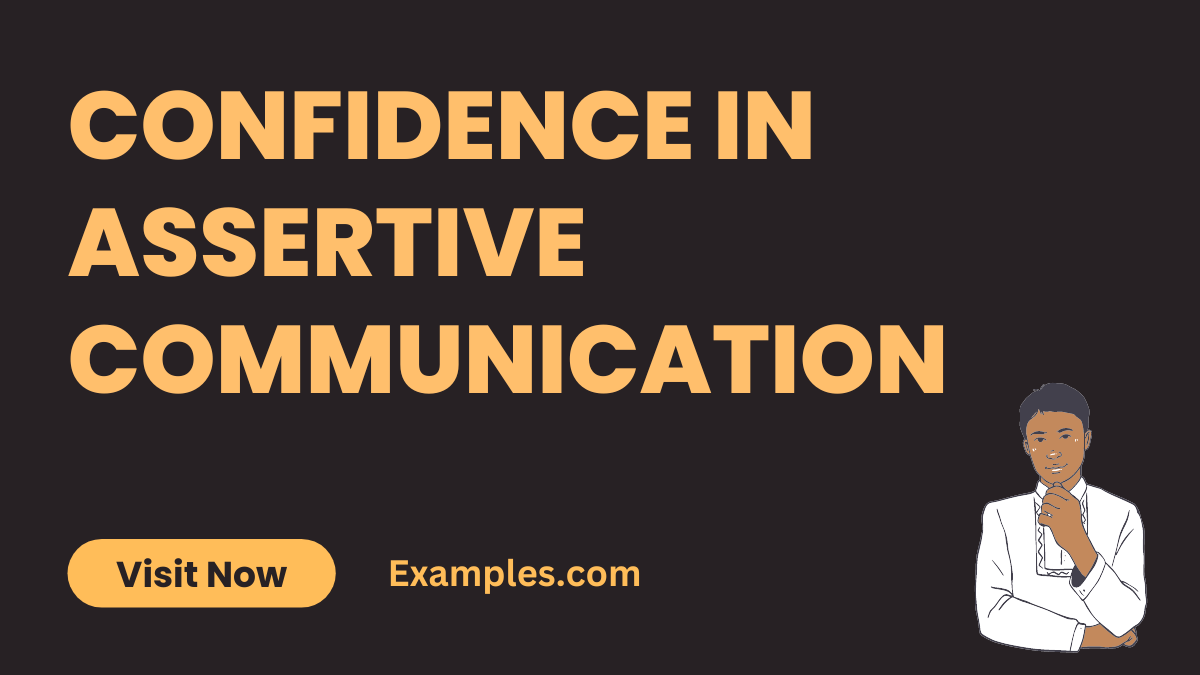19+ Confidence in Assertive Communication Examples
Confidence in assertive communication is a vital skill for effective interpersonal interactions. It involves conveying your message with certainty and poise, enhancing the impact of your words. This skill is essential in various scenarios, from Assertive communication Examples to personal dialogues, ensuring your points are presented with clarity and conviction. Confidence in assertiveness fosters respect and understanding in any exchange, making it a key component of successful communication.
What is Confidence in Assertive Communication?

Simple and straightforward, this section will offer a clear definition and meaning of what Confidence in Assertive Communication entails. It will break down the concept in simple English, making it accessible for all readers who wish to understand and improve their communication skills.
20 Examples of Confidence in Assertive Communication
Confidence in assertive communication is a vital skill for effective interpersonal interactions. It involves conveying your message with certainty and poise, enhancing the impact of your words. This skill is essential in various scenarios, from Assertive communication to personal dialogues, ensuring your points are presented with clarity and conviction. Confidence in assertiveness fosters respect and understanding in any exchange, making it a key component of successful communication.

- “I believe my experience uniquely qualifies me for this role.” This sentence asserts confidence by highlighting personal qualifications without overstating.
- “I would like to share my perspective on this matter.” Expresses openness and self-assuredness in contributing ideas.

- “I respectfully disagree with your point and here’s why.” Shows confidence in presenting an opposing view while maintaining respect.
- “I need some time to think this through thoroughly.” Indicates self-assuredness in decision-making processes.
- “I’m committed to finding a solution that works for both of us.” Demonstrates confidence in conflict resolution and collaboration.
- “I feel strongly about this issue and would like to explain why.” Communicates conviction in personal beliefs.
- “I understand your concerns, and I will address them.” Reflects confidence in handling objections or doubts.
- “I am confident we can reach an agreement.” Exhibits assurance in negotiation skills.
- “I value your input and would love to incorporate it.” Shows confidence in valuing others’ contributions.
- “I am proud of the work I have done on this project.” Reflects self-confidence in personal achievements.
- “I would appreciate your feedback on this.” Indicates confidence in seeking and valuing external opinions.
- “I believe this approach could benefit us greatly.” Demonstrates confidence in proposing strategies or ideas.
- “I have a few suggestions that might improve our process.” Exhibits self-assurance in offering improvements.

- “I am ready to take the lead on this project.” Shows readiness and confidence in assuming responsibility.
- “I trust my judgment in this situation.” Reflects self-reliance and confidence in personal decision-making.
- “I am keen to learn and grow in this area.” Displays confidence in personal development.
- “I am certain that we can overcome these challenges.” Exhibits a confident outlook towards resolving difficulties.
- “I am comfortable setting boundaries in our discussions.” Indicates confidence in maintaining personal limits.
- “I want to ensure our communication is clear and effective.” Reflects dedication to confident and efficient communication.
- “I am open to discussing this further if needed.” Shows confidence in engaging in extended dialogues.
Why Confidence is Important in Assertive Communication
- Enhances Credibility: Confidence in assertive communication bolsters your credibility. When you speak with certainty, your audience is more likely to trust and respect your opinions.
- Improves Clarity: Confident communicators convey their ideas clearly and effectively, reducing misunderstandings and enhancing the quality of interactions.
- Builds Relationships: Confidence fosters trust and openness in relationships, making it easier to form and maintain healthy professional and personal connections.
- Encourages Respect: When you communicate with confidence, others are more inclined to respect your views and consider your input seriously.
- Facilitates Decision-Making: Confident communication aids in clear and decisive decision-making, which is crucial in leadership and team dynamics.
- Reduces Anxiety: Speaking confidently can alleviate anxiety and nervousness, allowing for more composed and effective communication.
- Promotes Leadership Qualities: Confidence is a key trait of effective leaders. It helps in guiding teams and influencing decisions.
- Enhances Personal Brand: In the context of Assertive communication strategies, personal confidence can significantly uplift your professional image and reputation.
How to Speak Confidently and Assertively
- Practice Regularly: Regular practice can significantly improve your confidence in communication. Engage in public speaking, debates, or even role-playing scenarios to enhance your skills.
- Prepare Thoroughly: Being well-prepared for conversations or presentations can boost your confidence. Research your topics and anticipate questions or counterpoints.
- Use Positive Self-Talk: Encourage yourself with positive affirmations and self-talk. This can help in building self-confidence and assertiveness.
- Maintain Good Posture: Physical presence, including posture and eye contact, greatly influences how confidently you come across.
- Listen Actively: Active listening can give you a better understanding of the discussion, thereby increasing your confidence in responding effectively.
- Be Clear and Concise: Convey your message in a clear, concise manner. Avoid filler words and stay focused on your main points.
- Handle Feedback Positively: Embrace feedback as an opportunity to learn and improve. Respond to criticism constructively, without taking it personally.
- Stay Calm and Composed: In difficult conversations, maintaining your composure can greatly enhance your assertiveness and confidence.
Mastering confidence in assertive communication is key to expressing oneself effectively. This guide has provided essential tips and real-life examples to help you communicate with assurance. Remember, confidence is not just about what you say, but how you say it.



